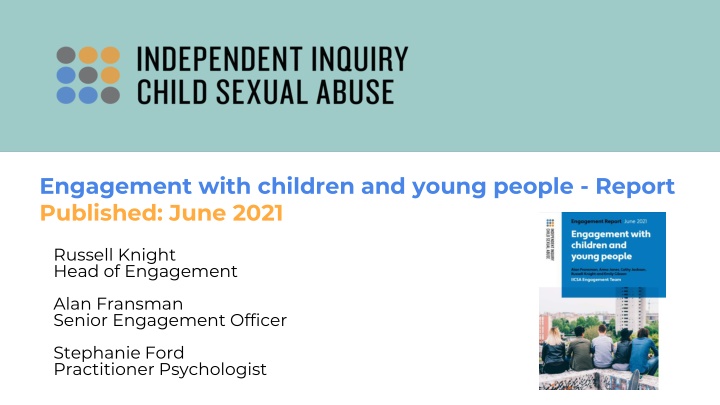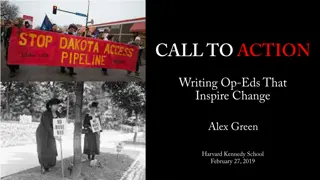
Inquiry into Child Sexual Abuse and Protection Failures
This report delves into the investigation of state and non-state institutions failing to protect children from sexual abuse, led by a panel including Professor Alexis Jay OBE. It explores the failings, actions needed, and steps for future protection, with upcoming publications on related topics.
Download Presentation

Please find below an Image/Link to download the presentation.
The content on the website is provided AS IS for your information and personal use only. It may not be sold, licensed, or shared on other websites without obtaining consent from the author. If you encounter any issues during the download, it is possible that the publisher has removed the file from their server.
You are allowed to download the files provided on this website for personal or commercial use, subject to the condition that they are used lawfully. All files are the property of their respective owners.
The content on the website is provided AS IS for your information and personal use only. It may not be sold, licensed, or shared on other websites without obtaining consent from the author.
E N D
Presentation Transcript
Engagement with children and young people - Report Published: June 2021 Russell Knight Head of Engagement Alan Fransman Senior Engagement Officer Stephanie Ford Practitioner Psychologist
Introduction to the Inquiry Russell Knight Head of Engagement Trigger warning: Mentions child sexual abuse
About the Inquiry Set up in 2015 to investigate organisations and institutions that have failed to protect children from sexual abuse Led by Chair, Professor Alexis Jay OBE and three Panel members - Professor Sir Malcolm Evans, Ivor Frank and Drusilla Sharpling CBE Supported by a Victims and Survivors Consultative Panel Independent of government Does not have the power to convict people of criminal offences, determine civil liability or award compensation
Terms of Reference consider the extent to which state and non-state institutions have failed in their duty of care to protect children from sexual abuse and exploitation consider the extent to which those failings have since been addressed identify further action needed to address any failings identified consider the steps which are necessary for state and non-state institutions to take in order to protect children from such abuse in the future publish a report with recommendations
Inquiry Core Projects Investigations Public Hearings Truth Project Engagement Research
Recent and upcoming publications Child Sexual Exploitation by Organised Networks (CSEN) Investigation Report (1st February 2022) Residential Schools Investigation Report (1st March 2022) LGBTQ+ Engagement Report Final Report
Engagement with Children and Young People Alan Fransman, Senior Engagement Officer Stephanie Ford, Practitioner Psychologist Trigger warning: Mentions child sexual abuse
Engagement with children and young people The engagement team spoke to 56 young victims and survivors from 11 organisations who have recent experiences of institutional failure. We also listened to the challenges that 77 specialist support workers face when supporting young victims and survivors. By doing this, we hoped to improve the Inquiry s knowledge about present-day experiences. The engagement activities were not formal evidence-gathering sessions, and this publication is not intended to be a comprehensive analysis of all the views we heard, nor does it make general conclusions about children who are victims of child sexual abuse in the wider population.
Participating organisations Journey After Child Abuse Trauma (JACAT) Team, CAMHS, Children and Family Health (Devon) Leicester Rape Crisis at Jasmine House National Society for the Prevention of Cruelty to Children (NSPCC) New Pathways (Wales) Nottinghamshire Sexual Violence Support Services One In Four (South London) The Roots Foundation Wales (Swansea) Safety Net UK (Cumbria) SERICC Rape and Sexual Abuse Specialist Service Ynys Saff / Safe Island SARC (Cardiff) Young Women s Outreach Project (Gateshead)
Discussion topics: How society talks about child sexual abuse How society responds to child sexual abuse The internet and social media Suggestions for change
Six key points 1. Young victims and survivors face delays in accessing support We also heard that the government should consider the long-term negative impacts for victims and survivors who have not received earlier support. 1. Young victims and survivors told us that the introduction of mandatory reporting could discourage children from disclosing their experiences of child sexual abuse. Many young victims and survivors told us that they were looking for psychological support, rather than action through the criminal justice system.
Six key points 3. Statutory bodies should improve their response to child sexual abuse and exploitation. Many young victims and survivors said their experience of the statutory services was traumatising and disempowering. 4. There needs to be a cultural shift, so that talking about sexual abuse becomes more acceptable We heard that the media s tendency to sensationalise child sexual abuse and focus on the perpetrator detracts from the impacts on the child.
Six key points 5. Relationships and sex education (RSE) in schools does not reflect current challenges facing children, and is mostly inconsistent and inadequate. We heard that RSE should focus on appropriate touch and consent, and should start younger. 6. Creators of social media apps and internet platforms must take greater responsibility. We heard that social media companies have a duty to better protect the children and young people using their apps.
Child and Adolescent Mental Health Services (CAMHS) The overwhelming majority of young victims and survivors we heard from shared negative experiences of their involvement with CAMHS. They felt that most CAMHS services did not understand the impact of child sexual abuse on a child s emotional and mental health. We heard that CAMHS services are severely underfunded and that there are high thresholds for accessing CAMHS services and the support was limited once it started. We also heard from one CAMHS service which is aware of these practices and criticisms, and has made an effort to operate in a different way, which was welcomed by its clients.
Final comments and reflections The young victims and survivors we spoke to all shared the same simple, yet very powerful requests: believe us give us choices listen to us respect us support us
For further information please visit our website:iicsa.org.uk iicsa.org.uk > reports & recommendations > reports Contact: engagement@iicsa.org.uk






















